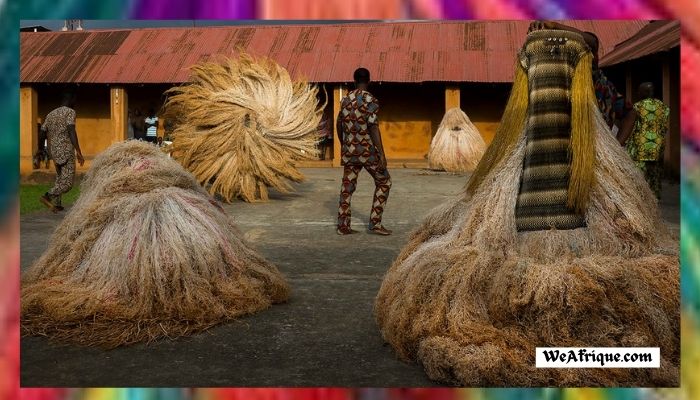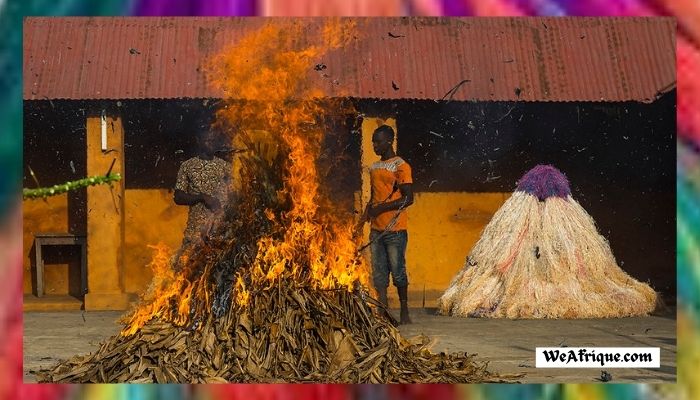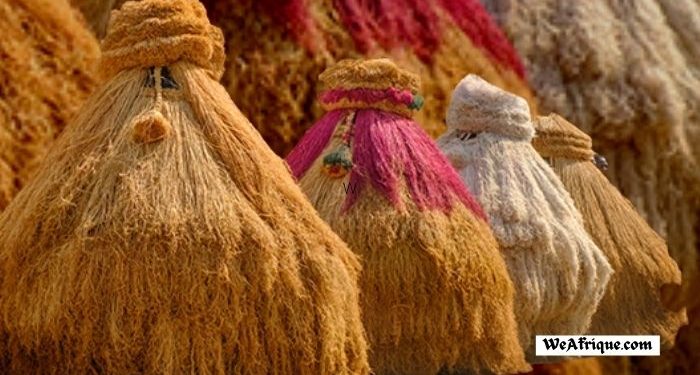Prior to the colonial era, the Egun people of Benin, Togo, Ghana, and Nigeria lived under the security watch of a masculine divinity called “Zangbeto”. They were known as traditional law enforcement agencies that kept the serenity of the community at night and also punished lawbreakers. The voodoo guardians of the night were greatly feared and revered by the Egun people.
This traditional way of policing and securing lives and properties can be traced back to over 6000 years ago and is seen as the cultural emblem of the people. The Zangbatos also engage in entertainment and other forms of magical display.
Although colonialism, Christianity, and other religious sects may have suppressed a larger part of these beliefs, these practices still prevail in some parts of West Africa.
Brief History Of Zangbeto
This system of policing by Zangbeto is as old as the hills of Benin. Its origin lies in the precolonial history of the Egun people of Benin, Togo, and Nigeria. It is also known as the traditional voodoo guardians of the night.
Going back in time, the practice relates a story of a just man who was punished arbitrarily and had to flee his hometown unnoticed at night. To achieve this, he disguised himself as a shady creature using dried leaves and raffia. On his escape, he bumped into a settlement of people who were also dressed like him. This was perceived as a call from the gods to protect others from injustice.
Another view of the story reveals that Zangbeto was formed in the mid 17th century by a strong group of men. These men were said to have erected a strong force to protect their community against foreign invaders and stronger kingdoms.
Facts About the Voodoo Guardian of the Night
1. Zangbeto Serves as a Traditional Way of Crime Control
Originally, the Zangbetos were formed to drive enemies away. They patrolled at night to ensure no enemy invaded the town. It is also believed that the group could sense a threat within a radius of 500metres. As part of their duties, detected thieves, burglars, and witches were punished. The fear this practice incites in foreigners and punishment given to offenders keeps everyone in check.
2. The Voodoo Practice is a Way of Life to the People of Benin
This practice may seem abnormal to a greater part of the system however, the people of Benin consider it very normal and practice it as a religion. According to sources over 40% of the population abides by its laws. In Benin, several events are held in honor of voodoo including a public holiday held in respect of voodoo and even a national voodoo museum.
Other forms of voodoo asides from the guardian of the night are; Gou (god of war and blacksmith), Sakpata (god of illness, healing, and earth), Heviosso (god of storms, lightning, and justice), and Mami Wata (god of water).
Read Also: 12 Famous African Gods and Goddesses With Unbelievable Capabilities
3. The Zangbeto that Entertains During the Daytime is Called “Klegbeto”

Zangbeto also serves the purpose of entertainment. The masquerade performs at ceremonies as a way of promoting cultural values and heritage. Zangbeto dances in a circular motion by spinning around. According to the people, this dance is meant to drive away evil spirits and protect the community from any evil eye. They also engage in other magical activities like walking on water, turning water into palm wine, and driving motorcycles.
It’s important to note that the term “Zan” means night in the Egun language thus, Zangbeto means “night watchman”. Therefore, the operations done by the voodoo group during the day are known as “Klegbeto”.
Also, during cultural practices, the Egun people are permitted to dance along with Zangbeto but it is forbidden to wear shoes while dancing to avoid being flogged by the masquerade.
4. Are Zangbetos Still Worshipped Today?
Similar to many ancient practices around the world, Zangebeto is still active and relevant. The Zangbeto devotees would rather seek protection and justice from the voodoo guardian of the night rather than the partial views of human authorities.
Moreso, with an increase in crime rate and corruption among leaders, many are of the opinion to revive the practice of Zangbeto. With the fear of its wrath, there will be a chance to live in a corruption-free society.
5. It is Believed that Zangbetos are Controlled by the Night Spirit and not Humans

Contrary to popular beliefs, there is no human under the Zangbeto costume. It is said that ancestral spirits of the night possess the haystack masquerade and cause it to dance. The empty haystack is also empowered to perform several magical wonders. The Zangbeto masters claim that the spirit has a way of reincarnating itself even if it is burned into ashes.
6. The Attire Worn by Zangebeto Attracts the spirit of the Night
According to the people of Egun, The voodoo of guardian has its own costume and demeanor. It is required that a figure appears in a haystack outfit in order to get possessed by the night spirit. The souls of the dead are directed into cone-shaped cosmetics by the tribesmen.
7. They Make Creepy Sounds to Announce Their Arrival
One way the voodoo guardian of the night alerts the villagers of his arrival is by making eerie sounds. By this, villagers would go into their huts while the policing patrol begins. These sounds are produced by drummers who followed the Zangbeto around the village.
8. It is a Taboo for Children to Mimick the Earie Sound Made by Zangbeto
Mimicking the sounds produced by the Zangbeto is considered disrespectful to the group. The people of Egun consider it an abomination. Parents whose children default are fined and in some cases, they are suspended from attending such gatherings.
9. Controversies among the People are Settled by the Voodoo Guardian of the Night
Since Zangbeto is regarded as a policing agent among the people, conflicts are also settled by him. In this case, the head of the Zanbeto group acts as the mediator in conflicting situations. Also, practices like swearing are initiated in issues concerning theft, murder, and real landowners.
10. The Zangbeto Practice Festival is Celebrated Once a Year
The Egun people of Badagry, Nigeria celebrate the Zangbeto festival in the month of April every year. This festival is said to last for a period of one week and aims at reuniting the community while promoting cultural values.





















Discussion about this post